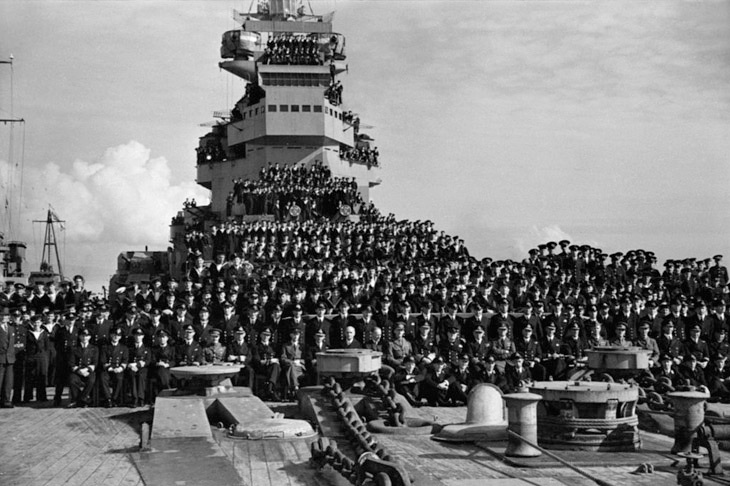During and after the second world war the Fourteenth Army in Burma became famous as the Forgotten Army, almost as famous for being forgotten as for its great victory. More truly forgotten, however, despite its great strategic achievement in keeping open the lifelines to the eastern empire, is the role of the Royal Navy in those warm and contested eastern waters.
Typically, the only events most of us hear of are the disastrous losses of Singapore and of the warships Prince of Wales and Repulse, the latter blamed on Winston Churchill. We read of ossified naval thinking in the 1930s, of inadequate preparation and procurement muddle, symptomatic of inevitable national decline and imperial overreach, and shake our heads and agree. It’s all the more cheering, therefore, to come across a book that not only challenges received opinion but convincingly refutes it.
Andrew Boyd, a former submariner and diplomat, now an academic, argues that historians have generally underestimated the importance of denying the vast Indian Ocean to the Axis powers. It was essential to the war effort not only for supplies to and from the Middle East, India and Australasia (and that forgotten Fourteenth Army), but in order to maintain the flow of Persian oil and to support Russia. The importance of the Persian supply route in keeping Russia in the war — once it had changed sides — is often underestimated and largely unacknowledged in histories of the second world war. For Britain, keeping open the Indian Ocean, and thereby denying the Axis the resources of the Middle East and safeguarding the war potential of India and Australasia, was essential to the successful prosecution of the war. This was ultimately far more important than holding Singapore or Malaya and indeed ranked second only to maintaining the Atlantic lifeline.
Boyd demolishes the props of received opinion one by one. At the end of the first world war the Royal Navy was the largest and most modern in the world. Postwar Treasury cuts certainly diminished its size, but into the 1930s it retained both global reach and an adequate edge over prospective enemies. By 1935 it was facing ‘block obsolescence’, but the rearmament programme then embarked upon was balanced and effective. It was not too
‘battleship heavy’ at the expense of aircraft carriers; the submarine threat was not ignored; convoy drill was rehearsed; industrial performance was comparable with that pre-1914, new technologies such as radar and Asdic (for detecting submarines) were more developed than by other powers; and German and Japanese tactics and capabilities were fairly accurately assessed.
Of course, there were failures and errors. Anti-aircraft protection at the start of the war was inadequate, although the fire-power deployed here was still far greater than in any other navy. Fleet Air Arm aircraft procurement suffered from RAF ‘dual control’, the inevitable priority given to fighter defence of the UK homeland and later from the shortcomings of American industry. In identifying the air problem early on, the Royal Navy suffered, Boyd argues, not by being too conservative but by being too visionary too soon. Its ambitious 1936 carrier programme was in advance of other powers but it could not fully anticipate the revolutionary changes in technology and tactics of the next few years.
Nor, crucially, did anyone anticipate fighting the war without allies. The Royal Navy’s two-hemisphere strategy was predicated on having an important ally in each hemisphere, France in the West and the US in the East. The precipitous collapse of France vastly extended Britain’s naval commitments in the western theatre and caused the US also to prioritise the Atlantic, while Pearl Harbor further reduced the effective US Pacific Fleet in the early stages of war in the East.
Boyd locates responsibility for the single greatest failure in the East, the loss of Prince of Wales and Repulse, firmly at the top of the Admiralty. Churchill certainly wanted to see a deterrent force deployed, but his focus was the Indian Ocean not Singapore. It was the Admiralty which insisted on resuming a forward deployment strategy in late 1941, despite the inadequate forces available, in the belief that this would bind the Americans into Far East defence. That led to disaster.
Such mistakes happen in war. The important point is that the Royal Navy had the strength and flexibility to recover from the initial disasters and to maintain a successful two-hemisphere strategy, keeping open the Indian Ocean throughout 1942 when domination by Axis forces could have had a decisive effect. As Boyd concludes, initial British defeats to Japan at sea were not in themselves a sign of imperial failure. They were temporary, albeit avoidable, setbacks eclipsed by long-term strategic success in securing what mattered most. After the protection of the Atlantic lifeline, this was the Royal Navy’s greatest achievement in the war.






Comments